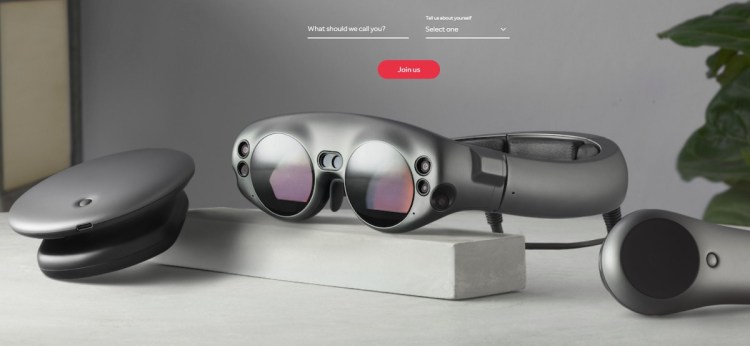Magic Leap apparently doesn’t think it’s too early to hold its first developer’s conference, complete with “a live-streamed keynote, more partnership announcements and plenty of demos on stage.” The company shared the news today with Engadget, which says that the conference is scheduled for October 9-10 in Los Angeles, with registration opening soon.
For reasons I couldn’t initially explain, the announcement feels premature. And after thinking about it, I understand why: Given Magic Leap’s track record, as well as the current pricing and ultra-limited availability of its Magic Leap One Creator Edition, an Apple-style keynote feels a year too early. Should anyone really care about a keynote for a product that almost no one owns, and as currently designed, no mainstream customer is going to buy?
In a recent interview with VentureBeat, Magic Leap’s CEO suggested that hype about the company’s work was “out of our control” as soon as Google made an investment. That might be plausible if there wasn’t so much evidence to the contrary — Magic Leap has been a hype machine for years.
It could have stayed quiet during development, but instead actively stoked the public’s imagination with plenty of “head exploded”-caliber hype and what turned out to be too-good-to-be-true demo videos. Meanwhile, it raised an unbelievable amount of money, defended itself against hype-deflating reports, and sought creative pitches for an Easter egg-laden unveiling, all while touting high-profile relationships with Lucasfilm and legendary game developers. In the process, it also burned through key marketing executives, including one who said he was being asked to misrepresent the reality of the upcoming product — a particularly damning claim coming from someone in marketing.
The basic concept of a developer’s conference, namely bringing developers together for tech sessions, is in no way objectionable. And the company is apparently planning at least 30 of those sessions, including how to use the hardware’s CPU, GPU, and spatial audio capabilities. All that will require is a critical mass of Magic Leap developers who are either already in or willing to visit Los Angeles — if the company thinks it has enough of those people to show up at an event, great.
But unless Magic Leap is ready to make some seriously big news about developments that will actually matter to the general public, it’s too early for a keynote. Put aside the widespread negative comments about the company’s past live online demos, which journalists and readers alike generally tore to shreds. The core issue to me is that there isn’t a consumer product at this stage (or likely to be coming soon) that’s worthy of a public keynote.
iFixit tore down a Magic Leap One this week and concluded that the hardware was rushed out just to get something into developers’ hands. In other words, it’s not ready for mainstream customers, and still appears to have plenty of work ahead to get to that point. Regardless of how cool the technology may be, pretty much everyone in the tech world saw red flags immediately upon learning that the hardware requires white-glove customized fit sessions and (for wearers of glasses) prescription lenses.
I have no issue whatsoever with Magic Leap as a company, and applaud it for having both the moxie and wherewithal to create an entire new computing platform: a proprietary display technology, a complete AR headset, a largely new computer, and a new operating system, complete with its own conceptual paradigms. There’s a ton to be proud of there, and plenty of people left to educate about how it all works.
At this point, however, the first-generation hardware is out there, and prospective users can choose to buy it (or not) for $2,295. Instead of wasting time on speeches and hype, it’s time for Magic Leap to devote all of its resources to (rapidly) finalizing a product people will actually buy. Until the price drops radically and the user fitting process becomes nearly universal, this technology has no chance of becoming important with anyone except a small pool of wealthy people — most of whom will quickly move on to the first rival platform that gets pricing and fit issues right. A keynote won’t bring Magic Leap any closer to that goal, but releasing a viable second-generation headset will.

